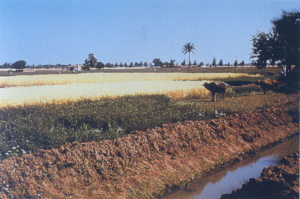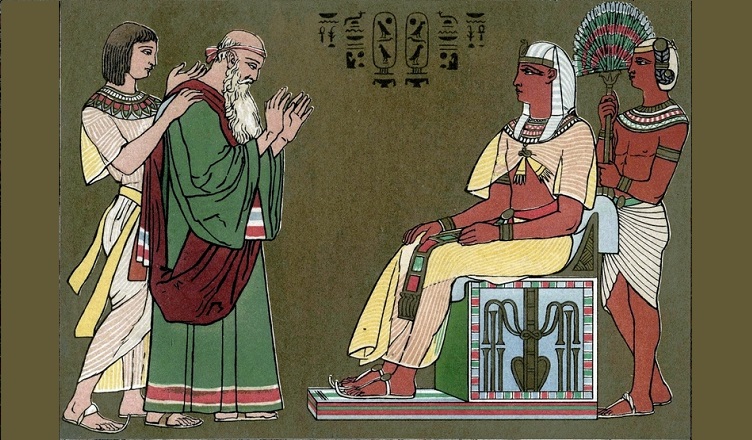From Genesis 46-47
 Jacob and his family meet Pharaoh. Destitute and in danger of starvation, they become Egypt’s servants and slaves. Pharaoh asks Jacob how old he is. Jacob’s one hundred and thirty years have been ‘few and evil’.
Jacob and his family meet Pharaoh. Destitute and in danger of starvation, they become Egypt’s servants and slaves. Pharaoh asks Jacob how old he is. Jacob’s one hundred and thirty years have been ‘few and evil’.
This post is part of my bible in a year series.
Passage and Comments
In today’s passage key members of Josephs family are presented before Pharaoh.
47 So Joseph went in and told Pharaoh, “My father and my brothers, with their flocks and herds and all that they possess, have come from the land of Canaan. They are now in the land of Goshen.”
2 And from among his brothers he took five men and presented them to Pharaoh.
3 Pharaoh said to his brothers, “What is your occupation?” And they said to Pharaoh, “Your servants are shepherds, as our fathers were.” 4 They said to Pharaoh, “We have come to sojourn in the land, for there is no pasture for your servants’ flocks, for the famine is severe in the land of Canaan. And now, please let your servants dwell in the land of Goshen.”
5 Then Pharaoh said to Joseph, “Your father and your brothers have come to you. 6 The land of Egypt is before you. Settle your father and your brothers in the best of the land. Let them settle in the land of Goshen, and if you know any able men among them, put them in charge of my livestock.” (Gen 47.1-6)

‘Goshen’. Jacob and his family have settled in Goshen. This is only a temporary stay for God’s people.
‘Occupation’. Jacob and his family are destitute. Their only option for surviving is to put themselves into service (or slavery) to one who will take care of them (cf. Ex 21.2-11; Lev 25; Dt 15.1-18).
Pharaoh generously wants to put them into his service. So he asks them what they do for a living. They are shepherds.
This is the point where Israel becomes enslaved to Egypt.
Joseph’s family gains employment and a place to stay in a time of severe famine.
7 Then Joseph brought in Jacob his father and stood him before Pharaoh, and Jacob blessed Pharaoh.
8 And Pharaoh said to Jacob, “How many are the days of the years of your life?” 9 And Jacob said to Pharaoh, “The days of the years of my sojourning are 130 years. Few and evil have been the days of the years of my life, and they have not attained to the days of the years of the life of my fathers in the days of their sojourning.” (Gen 47.7-9)
‘Jacob blessed Pharaoh’. Instead of Pharaoh blessing Jacob. Jacob is the one who blessed Pharaoh. The blessing includes Pharaoh’s land as well. Consider the work of Joseph.
‘How many?’ Pharaoh questions Jacob on his age. This would seem to have a direct connection with the ages to which the first few generations lived. Clearly Jacob is aware of longer life spans in the past.
‘Few and evil’. He describes his own of 130 years as ‘few and evil’. Jacob’s reply alludes to the many sorrows in his life (his flight from home and Esau, His work under Laban, Rachel’s death, the rape of his daughter Dinah, Joseph’s presumed death).
Today people begin to think they are old at 25, sometimes earlier. I think we are wrongheaded about how we think about age.
Consider this list from some of todays lifespans

- Arctica Islandica (Ocean quahog) A species of edible clam. 405 – 410 years
- Bowhead Whales – 200 years
- Eels – 150+ years
- Tuataras – A New Zealand Reptile. 100 – 200+
- Galápagos giant tortoise – 190 years.
- Greenland Sharks – 200+ years
- Koi – 200+ years.
- Macaws – Long-tailed parrots. 80 – 100 years in captivity.
- Asian elephants – 86 years
- Horses – 25 to 30 years
10 And Jacob blessed Pharaoh and went out from the presence of Pharaoh.
11 Then Joseph settled his father and his brothers and gave them a possession in the land of Egypt, in the best of the land, in the land of Rameses, as Pharaoh had commanded.
12 And Joseph provided his father, his brothers, and all his father’s household with food, according to the number of their dependents. (Gen 47.7-12)
‘Jacob blessed Pharaoh’. Jacob’s blessing of Pharaoh had a positive effect on Pharaoh’s prosperity. Divine blessing on Egypt was immediately apparent through Joseph supplying the Egyptians with grain during the famine.
Story of Israel

Genesis 46 ends with a genealogy highlighting that ‘all the persons who came into Egypt were seventy.
The list of Jacob’s descendants names seventy people who went down to Egypt with him. Seventy is also the total number of nations listed as descendants of Noah in Gen 10, so seventy had some symbolic significance in Bible times. This is confirmed by a careful reading of Gen 46:8–27, which shows the author’s keenness to make the total come to seventy. …
[One scholar] has suggested that seventy represents totality: it expresses the idea that all Israel went down to Egypt. It also shows how the promise of a multitude of descendants, first made to Abraham (Gen 12:2), is progressing toward fulfillment.
The first readers of Genesis would have recognized these names, not simply as the names of their ancestors but as names of tribes and clans, so to them the fulfillment of the promise would have been even more apparent. (Wenham, G.J., 2003. Genesis. In J. D. G. Dunn & J. W. Rogerson, eds. Eerdmans Commentary on the Bible. Grand Rapids, MI; Cambridge, U.K.: William B. Eerdmans Publishing Company, p. 69.)
Story of Jesus
Today’s passage explains how Israel came into Egypt’s service and became their slaves. The situation was friendly at the time, but afterwards it will sour.
Thus the stage is set for God demonstrate his faithfulness to his covenant promises and to rescue his people from slavery. This act of deliverance becomes paradigmatic for what Jesus does in the gospel.
68 “Blessed be the Lord God of Israel, for he has visited and redeemed his people
69 and has raised up a horn of salvation for us in the house of his servant David,
70 as he spoke by the mouth of his holy prophets from of old, 71 that we should be saved from our enemies and from the hand of all who hate us;
72 to show the mercy promised to our fathers and to remember his holy covenant,
73 the oath that he swore to our father Abraham, to grant us
74 that we, being delivered from the hand of our enemies, might serve him without fear,
75 in holiness and righteousness before him all our days. (Lk 1.68-75)
Copyright © Joshua Washington and thescripturesays, 2014. All Rights Reserved.

